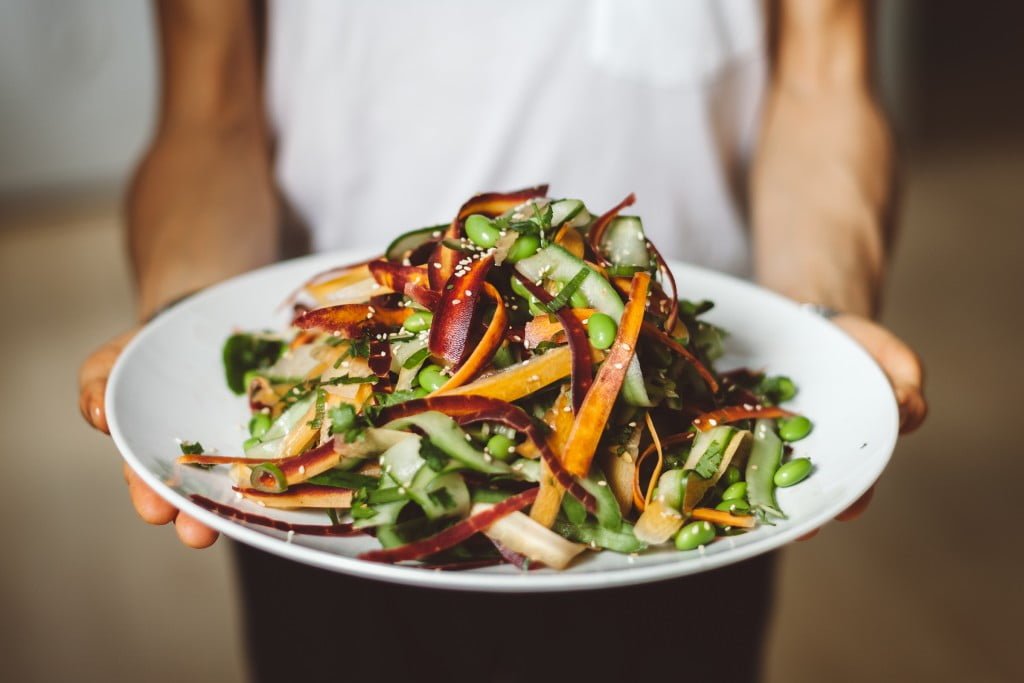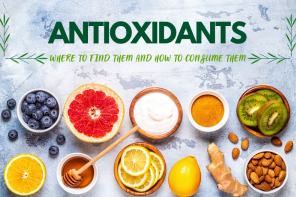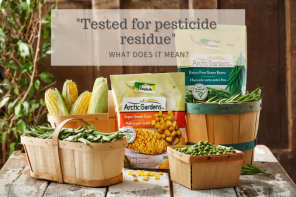The shift towards vegetarianism, and other meatless diets, has grown significantly among teenagers in recent years. When carried out correctly, this diet approach can support strong, healthy teens. Focusing meals around whole (unprocessed) plant foods, including a wide variety of colorful nutrient-dense vegetables, protein sources such as legumes*, pseudo-grains*, whole soy foods*, and good fats*, will provide teenagers with a proper balance of essential *macronutrients and micronutrients*, for optimal health, and disease prevention.
Breeds of Meatless Diets
Vegetarian, vegan, pescetarian, and Whole Food, plant-based
Vegetarianism is just one of a few meatless diets being adopted by teens today. This approach to eating, is free of meat and fish, but may include eggs, and dairy products. Another term for a similar diet is Ovo-lacto, which discludes meat or fish, yet focused on eggs and dairy as staple protein sources. A vegan diet is void of all animal products including meat, dairy, and eggs. While pescitarians do not eat meat from land animals, they do eat fish, as well as eggs, and dairy.
A Whole Food, Plant-Based Diet (WFPB) fundamentally differs from these other dietary approaches, as it emphasis what TO eat (whole plant foods) , rather than what NOT to eat (animal products). A WFPB diet is centered on a wide variety of whole, nutrient-dense vegetables, *pseudo-grains, *legumes, fruit, nuts and seeds, and contains little or no processed foods.
As its name indicates, a WFPB diet is centered on a wide range of whole plant foods including a wide range of vegetables, fruit, pseudo-grains, legumes, whole soy, nuts and seeds. While the vegetarian or vegan diets do not necessarily specify the quality of food, only the food groups discluded, a WFPB diet is defined in part by a focus on unprocessed ‘real’ food, over refined items – which can be free of animal products, but are not necessarily healthy.
Vegetarian Nutrition In a Nutshell
Essential nutrients for healthy teens

Photo Credits: Lauren Kolyn
Adolescence is a time of significant physical, mental, and emotional development. To support this growth, teenagers require plenty of energizing, protein-rich, nutrient-dense, whole foods. Teens need approximately 2000-2500 calories a day, a significant shift from their childhood needs, which is why you may notice your teen emptying the fridge and pantry at a rapid pace!
However, not all calories are created equal. Rather than relying on low-nutrient, starchy simple carbohydrates (ex: white bread, pasta, white rice, white potatoes), opting for more nutritious, fiber-rich complex carbohydrates – from a wider spectrum of colorful vegetables, is optimal for energy, disease-prevention, blood sugar balance, and weight management. Fruit is another sugar-rich simple carbohydrate that is higher on the glycemic index, and therefore should be eaten in a smaller ratio compared to vegetables. Teens can aim for six servings of vegetables a day, and three servings of fruit per day, for healthy blood sugar regulation.
Yet, eating only vegetables is not satiating or nutritionally complete, so teens must include a whole-food protein to three of their main meals each day – from a variety of vegetarian sources including legumes*, pseudo-grains*, some whole soy*, nuts and seeds. It is important for your teen to eat a range of plant-based protein sources each day, in order to obtain a full spectrum of essential amino acids, aiming for 40-50 grams of protein per day. Learn more about plant-based here!
Vitamin B12
While a vegetarian diet is rich in most nutrients, it is lacking in Vitamin B12, found in meat. On any meatless diet, one can obtain this essential nutrient from a daily B12 supplement, necessary to prevent deficiency.
Calcium
If your teen does not consume dairy products, they can obtain calcium from many other plant sources, including leafy greens (spinach, arugula, beet greens, turnip greens, collards, bok choy, and kale), legumes (especially navy beans), tofu, nuts and seeds (namely sesame seeds and almonds), dried herbs (summer savory, dill, basil, marjoram, thyme, oregano, mint, rosemary), and whole oranges.
Teens who are lactose intolerant or sensitive to dairy products, can obtain sufficient calcium from these plant-based foods. Dairy is high in saturated fat and cholesterol, which is linked to an increased risk of disease (diabetes, heart disease, obesity), when consumed in large quantities. It is therefore important to limit these products to 3-4 servings a week, for disease prevention. One egg is a serving size, and 4 dice is a single serving of cheese.
Iron
Teens have a greater need for iron, as they are actively build muscle mass, which means greater blood volume. In females, iron becomes depleted as they begin menstruating, and therefore require sufficient iron stores. The average daily iron intake for teens (12 -19 years old) is 15 mg/day. Whole plant foods that are rich in iron include lightly cooked spinach, tofu, pseudo-grains*, legumes*, nuts and seeds, and dried fruit. In a single day, this could include one-cup of sautéed spinach, a half-cup of cooked lentils, half a cup of cooked farro, and two tablespoons of sesame seeds, for example.
Zinc
Another essential mineral for growth is Zinc, which is often equated with animal products, however it is also found in many plant foods. Sesame seeds, pumpkin seeds, cashews, legumes, quinoa, and tempeh, are all great sources of zinc, and protein!
Essential Fatty Acids (Omega-3 & Omega-6 fats)
As the teenage brain and body changes, potentially contributing to fluctuating moods, proper nutrition is especially important! We know that good quality food supports a good mood, and certain key nutrients help the brain in areas of focus and memory. Essential fatty acids, found in hemp seeds, chia seeds, walnuts, and freshly ground flax seeds, are especially beneficial brain and hormone-balancing foods that also provide protein, minerals, and fiber.
Getting Teens into the Kitchen
Cooking is key for proper plant-based nutrition
From planning to preparing
Cooking is at the root of healthy eating, and learning how prepare, simple, delicious and nutritious meals, is an essential life skill that allows your teen to become self-reliant, healthy adults. Welcome your teen to participate in the weekly meal planning, and join you at the grocery store, demonstrating how to source healthy food.
If the rest of your family is not vegetarians, your teen will require a slightly different grocery list, which you can suggest they start writing down themselves, to serve as a guide at the grocery store.
Let your teen do the cooking
As a child transitions into teenagehood, they start to crave more independence, in all areas of life – including their dietary choices. We can nurture this natural process, encouraging them to learn more about themselves as individuals. Given the teenage desire for autonomy, your teen may prefer to go grocery shopping independently, for example.
Allowing them to have more responsibility around food, especially if they are transitioning towards vegetarianism, can be an effective, positive approach. Encourage them to experiment with new foods and recipes that excite them, which can motivate them to cook. If your teen is uncomfortable in the kitchen, I suggest starting slow – by making simple recipes like smoothies using frozen fruit, with the addition of hemp seeds for protein. Or, homemade bean dip (like a savory smoothie!), enjoyed with a colorful array of vegetables, another healthy snack option.
Here are some recipes you can try with your teenager:
Chick peas, Broccoli and Apple Salad with Caramelized Pecans
California Vegetable Tabbouleh
Moroccan Red Lentil Vegetarian Soup
Variety is the spice of life
Keeping a functioning blender and food processor on your kitchen counter, for easy access, makes your teen more inclined to use these kitchen tools, and prepare healthy meals. Also, maintaining a well-stocked pantry, fridge, and freezer, makes it easier for teens to whip up a healthy meal, without having to go shopping for a long list of items. Cooking staples like spices, vinegars, olive oil, nuts, seeds, pseudo-grains, canned or dry legumes, aromatics like garlic, ginger, onions, salad greens and fresh herbs, plus frozen veggies (pre-chopped for convenience!), berries, and edamame – are all healthy items to have on hand.
Teach your teen
Cooking, like any activity, can be an enjoyable experience, when approached in an enthusiastic manner. As a parent, modeling a positive relationship with cooking, and healthy eating, will have a positive impact on your teen – as you are planting the seed. Learning through observation, in a non-stressful environment, is healthy way for your teen to pick up basic food preparation skills.
Enjoy the Teen Transition
Embracing the shift towards independence and a vegetarian lifestyle

Photo Credits: Danielle Levy
The transition from childhood to teenage-hood can be challenging for both parents and teens. However, embracing this natural change, rather than resisting it, helps everyone enjoy this life stage. As teens crave more and more independence, they may enjoy doing their own cooking. You can celebrate this initiative, by inviting your teen to share one of their dishes at a family dinner for example. This supports their desire for autonomy, while acknowledging their important involvement in the family, while also providing an opportunity to give them positive feedback – helping build their confidence in the kitchen. If a dish does not come out as intended on the first shot, we can ask them what they learned from the ‘food experiment’, and encourage them to keep trying. It is all about progress, not perfection!

FOOD GLOSSARY:
*Pseudo-grains: Quinoa, farro, buckwheat groats, freekeh, amaranth.
*Legumes: Beans, peas, lentils.
*Whole Soy Foods: Edamame, tempeh, tofu.
Note: Limit soy to 4-5 servings a week, so as not to over consume it, which can cause sensitivity. Everything in moderation!
* Healthy fats: Nuts, seeds, avocado, olive oil, nut/seed oils.
Macronutrients: Carbohydrates, protein, fat
Micronutrients: Vitamins, minerals, antioxidants.









